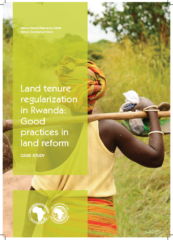
Rwanda undertook various land reforms in previous decades to address issues connected to land tenure security in a policy environment that neither truly decentralized land governance to local communities nor attempted to introduce it in a manner that guarantees social and gender equity. In the Rwandan context, establishing a well-functioning system for land rights is central to addressing development challenges facing the country. The on-going land tenure reform is meant to support the development process through improved tenure security for all categories of the population.
Yet, the reform also has a noticeable element of increased efficiency, transparency, citizen participation and development of viable land governance institutions. Rwanda’s new LTR process and approach have attracted global attention, making them worth studying to document best lessons for the benefit of other countries undertaking or planning similar interventions (Ali et al. 2014; Bizoza, 2015).
This report does not set out to provide a critical analysis of the major academic theories on the land question in Rwanda; but rather to review the Land Tenure Regularization process, assess the enabling policy and institutional frameworks and draw major lessons to inform land tenure regulation interventions in Africa.

Rejoignez-nous sur
LinkedIn